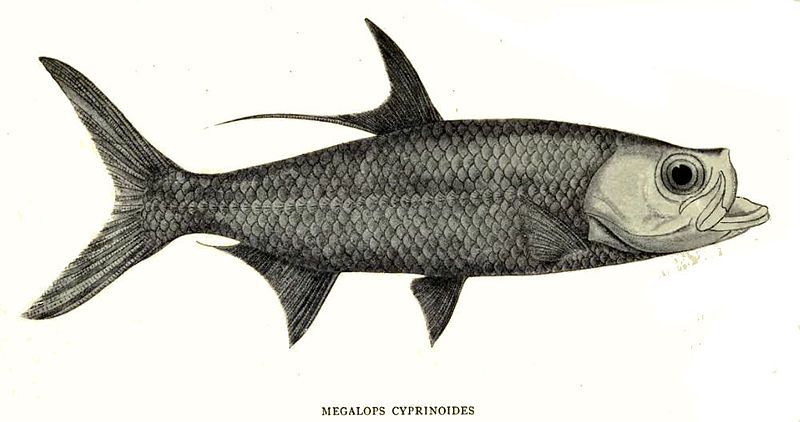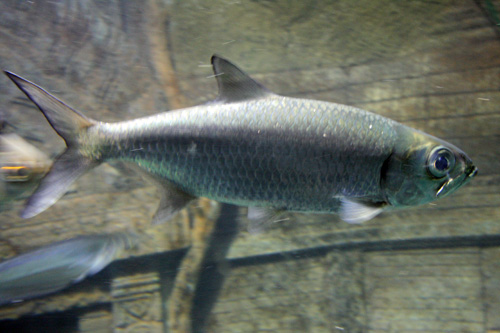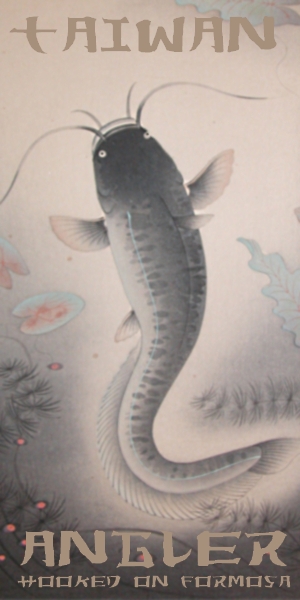Estuary Target: Indo-Pacific Tarpon
 Friday, April 22, 2011 at 10:34AM
Friday, April 22, 2011 at 10:34AM Family: Megalopidae
Scientific name: Megalops cyprinoides
Common names: Indo-Pacific tarpon, Oxeye, Oxeye tarpon
Chinese name: 印度太平洋大海鰱 (Yìndù tàipíngyáng dàhǎi lián or just dàhǎi lián)
Habitat: Estuaries, bays, coastal rivers
Size range: Up to 90 cm, though more common in the 50 cm range.
The word “tarpon” usually brings to mind images of huge silver-scaled beasts making breath-taking jumps, testing both angler and tackle in estuaries and on coastal flats. This, however, is the Atlantic tarpon, cousin to the Indo-pacific tarpon that are found in abundance in Taiwan’s estuaries and tidal backwaters April through October. Though not a heavy-weight bruiser like the Atlantic tarpon, the Indo-pacific or oxeye tarpon is nonetheless one of the most popular estuary targets on the island. It is also one of the few native wild fishes that can be pursued around the metro Taipei area in Dansui River as well as streams and estuaries that feed into it.
Though adult tarpon resemble herring in appearance with their up-turned mouths and elongated lower jaws, they are Elopiformes that are actually more closely related to eels. Like all Elopiformes, they can live in both salt and fresh water, spending most of their time in brackish estuaries and moving to the open sea to spawn. Along with their pronounced jaws, tarpon can be identified by the last ray of their dorsal fin, which is considerably longer than the others, nearly reaching the tail.
Where Indo-pacific tarpon diverge most from the Atlantic variety is in size. While Atlantic tarpon can reach lengths of 250 cm, Indo-pacific tarpon max out at around 90 cm, and 50 cm is listed as a more common length. In fact, most tarpon caught by anglers in Taiwan are juveniles in the 30-40 cm range, which makes them perfect light tackle targets. Any rod and reel setup capable of handling a healthy rainbow trout, for example, is probably suited to local tarpon fishing.
 Tarpon have voracious appetites and are aggressive predators. They typically feed on anything from small baitfish to aquatic crustaceans like shrimp and crabs. They can often be seen feeding near the surface in schools, making them ideal targets for sight casting lures and flies. A variety of artificial lures are suitable for Indo-pacific tarpon, but most local anglers seem to favor small plastic grubs and metallic spoons. Fly anglers usually cast streamers that imitate small baitfish.
Tarpon have voracious appetites and are aggressive predators. They typically feed on anything from small baitfish to aquatic crustaceans like shrimp and crabs. They can often be seen feeding near the surface in schools, making them ideal targets for sight casting lures and flies. A variety of artificial lures are suitable for Indo-pacific tarpon, but most local anglers seem to favor small plastic grubs and metallic spoons. Fly anglers usually cast streamers that imitate small baitfish.
Like their larger cousins, Indo-pacific tarpon don’t disappoint when hooked, often making acrobatic, head-shaking leaps. For light tackle fun, they are hard to beat.
Tarpon can be found in coastal estuaries in nearly every part of Taiwan, with the possible exception of the rocky stretch coastline between Yilan and Hualien.









